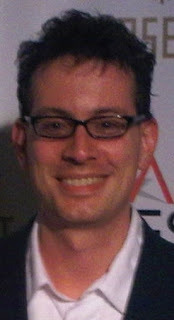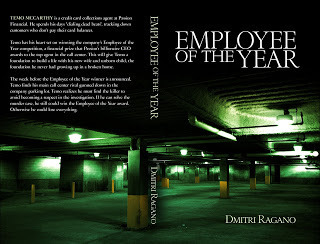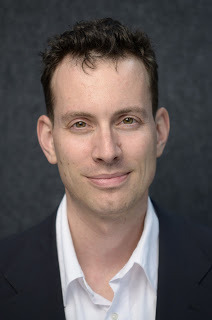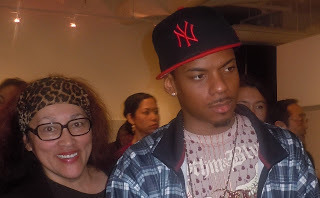Dmitri Ragano's Blog, page 5
January 1, 2012
2012
Happy New Year. I am blessed to have all the things that matter to me in life. Hope all of you out there find what you're looking for in this new year.
Published on January 01, 2012 20:42
November 21, 2011
Content Strategy on Slideshare.net homepage
My presentation on creating a global content strategy made the top spot on Slideshare today along with some of presenters from Lavacon. Congratulation to Jack Molisanti on putting together such an amazing conference covering so many different aspects of digital strategy and content management.
http://www.slideshare.net/dmitriragano/dmitri-ragano-creatingaglobalcontentvaluechain
http://www.slideshare.net/dmitriragano/dmitri-ragano-creatingaglobalcontentvaluechain
Published on November 21, 2011 13:04
November 19, 2011
Men of Mystery
Attending this conference locally in Irvine today.
Published on November 19, 2011 08:06
November 17, 2011
My presentation on Content Strategy at Lavacon
Published on November 17, 2011 20:48
November 15, 2011
Amazon reviews for "Employee of the Year"
The great satisfaction for an author, besides the enjoyment of the writing process itself, is telling a story to an audience and getting feedback.
I have no idea whether my story will resonate with an audience of 100 readers or an audience of 100,000 readers... but the beauty of self-publishing and digital distribution is I don't have to worry about that to get my voice out there and see who wants to hear it.
For me one of the most wonderful things about the era of e-publishing is that we all get a chance to tell our story to an audience. There are no gatekeepers.
That's why it is such a pleasure for me to see some positive reviews for Employee of the Year from readers who have enjoyed reading my novel. Thank you so much for your feedback. It means so much for me.

I have no idea whether my story will resonate with an audience of 100 readers or an audience of 100,000 readers... but the beauty of self-publishing and digital distribution is I don't have to worry about that to get my voice out there and see who wants to hear it.
For me one of the most wonderful things about the era of e-publishing is that we all get a chance to tell our story to an audience. There are no gatekeepers.
That's why it is such a pleasure for me to see some positive reviews for Employee of the Year from readers who have enjoyed reading my novel. Thank you so much for your feedback. It means so much for me.
Published on November 15, 2011 18:21
Lavacon Content Strategy Conference
This week I've been Lavacon attending a terrific conference on content strategy in Austin, Texas. There's been terrific representation and discussion around so many aspects of web content management: including structured authoring, localization, SEO, social media, translation management, the list goes on and on.
It's really nice seeing a collective interaction like this that hits all the key points of intersection that are critical to the challenges of global online content.
Tomorrow I'll be giving a presentation on Content for Global Audiences.
It's really nice seeing a collective interaction like this that hits all the key points of intersection that are critical to the challenges of global online content.
Tomorrow I'll be giving a presentation on Content for Global Audiences.
Published on November 15, 2011 18:15
November 13, 2011
My Interview with Yayoi Winfrey on Watermelon Sushi Blog
Yayoi Winfrey was kind enough to interview me regarding my book and my experience as an author.
You can read it here.
Yayoi is working on a film inspired by her own life story called Watermelon Sushi. She also runs a great blog of the same name. Yayoi I first met Yayoi Winfrey at the Mixed Roots Film Festival in Downtown Los Angeles on Loving Day in June 2009.
Interview transcript below:
Word up, Hip Hapa Homeez! We at Watermelon Sushi World are so HAPAto call you our homeez. Because of your dedication, we're moving towards getting our Watermelon Sushi film completed. One of the ways we've been doing that is by offering Hapa*Teez t-shirts to the mixed roots community. With every t-shirt purchase, you get us closer to our goal. And, you earn a rear crawl credit--your name will roll at the end of the movie.
 Cassie as hip HAPA homeeWhen you do buy a t-shirt, please email us at hapateez@me.com with your correctly-spelled name. And, if you send us a digi photo of you wearing your t-shirt, we'll showcase you on ourWatermelon Sushi and Hapa*Teez fan pages on Facebook (like Cassie, here).
Cassie as hip HAPA homeeWhen you do buy a t-shirt, please email us at hapateez@me.com with your correctly-spelled name. And, if you send us a digi photo of you wearing your t-shirt, we'll showcase you on ourWatermelon Sushi and Hapa*Teez fan pages on Facebook (like Cassie, here).
Hey, here's a shout-out to Arana, The Topaz Club founder, for her recent purchase. Join The Topaz Club group page on Facebook where mixed-race women of African descent share their stories.
Speaking of stories, this week's featured hip hapa homee is Dmitri Ragano who just completed his novel, Employee of the Year. Your Hip Hapa first met Dmitri after stumbling upon his interview with Japan enka star Jero. After corresponding for a while, we met in person--along with Dmitri's beautiful wife and daughter. Below, Dmitri discusses his life and how he came to write a book about a multiracial character.
Q: Tell us about your parents.
A: I am a typical garden-variety white guy so I might be something of an anomaly in the Watermelon Sushi World. My mother came from an Irish German family and my father from an Italian family. They grew up blue-collar Catholic in Pittsburgh, then broke away from the church during the Vietnam War era. They gave me an exotic name that they liked from Russian literature.
 Dmitri at AFI FestQ: How did the way you grow up affect your life?
Dmitri at AFI FestQ: How did the way you grow up affect your life?
A: I grew up in Wilkinsburg, Pennsylvania, a town on the edge of Pittsburgh that was predominantly African American. I had exposure to different cultures at a young age. I was often the only white guy in my elementary school class so there was exposure to art and popular culture that was different than my own. I remember very vividly when the early rap songs like "The Message" came out. That style of using rhythm and poetry to deal with real-world situations was a big influence on my fiction writing. Another influence was August Wilson, who broke onto the national scene when I was a teenager with plays about the African American experience in Pittsburgh.
During college in San Francisco, I went to Japan to study the language. For a while, I lived in a remote part of the country where I was the only foreigner in the town. The process of learning to communicate in a new language in a foreign country is slow, painful and humiliating. But once you get to the other side, the rewards are amazing. It unlocks certain parts of your brain and heart you didn't know existed. Charlemagne said, "To possess a second language is to possess a second soul."
So, the combination of these experiences created an openness and curiosity about other people's cultures. On the flip side, for better or for worse, it instilled this sense that I was an outsider and that it was sort of my destiny to go out and search to find my place in the world. Again, this is a theme with many characters in my book: they don't have a map for how to live their lives so they take scraps of maps they find along the way and try to piece them together.
Q: Were you accepted in every country where you've lived?
A: I have traveled to around 25 countries, but Japan is the only country outside the U.S. where I've lived. I lived in Japan several times for a total stay of about five years. It was a great experience, but you need to qualify the word "acceptance" when you talk about living in Japan as a foreigner. Japan is a very homogeneous and insular culture, and it's been that way for thousands of years. There's been no significant immigration in the whole recorded history. When you live in Japan, you live as a guest and you are treated with incredible kindness and hospitality. But like a guest in a hotel, you never really feel completely at home, you never expect to be completely accepted. You always feel like at some point you will overstay your welcome and have to leave. This is not everyone's experience, but I think it is a typical experience of most foreigners who live and work in Japan. Thekanji characters for the word "gaijin" literally mean "outside person".
Q: Tell us about your interracial marriage and biracial child.
A: My wife and I met in San Francisco at a party held by these Japanese monks who lived by Haight and Fillmore. They would cook all this Buddhist vegetarian food and play reggae concerts in the basement. She was trying to learn English and I was trying to learn Japanese. We were friends for many years before we became romantically involved and decided to marry.
Being from different cultures is challenging. You come at things from a different frame of reference. My wife's experiences being raised in Osaka are so dramatically different than what I knew growing up. The stories you tell yourself about who you are and how you should live are completely different. The good news is we love each other very deeply and share the same core values. But we've spent the early part of our lives learning to express the love and values in different ways. So it takes a long time to work this out.
For our daughter, I think this has pros and cons. She's exposed to a wide range of ideas and experiences and she knows we care about her more than anything. But I am sure sometimes it's got to be confusing for her compared to, say, having two parents who grew up in the same country with the same language, same culture and same socioeconomic background.

Q: What motivated you to write Employee of the Year, about a mixed roots character in a multicultural workplace?
A: I think there are more young people growing up like my daughter, who are mixed roots and exposed to many different customs, values, languages and ways of life. Yet, I believe there is still a lack of stories in our popular culture that reflect this. So I felt there was an opportunity to write about characters that grow up straddling different racial and cultural experiences and how they negotiate their own identity. There's no tribal blueprint for the type of person they should try to become. It's a riddle they have to solve on their own. On top of that, my story is set in a big financial company in Los Angeles. In this city, on top of mixed roots experiences, you have mixed class experiences, interactions between people from different educational and economic backgrounds. These are all things we have so much trouble talking about in America. A company is a good setting for a story about this. In Los Angeles, the 1 percent and the 99 percent only set foot in the same zip code during working hours. Dmitri channels Temo
Dmitri channels Temo
Q: Is the main character, Cuauhtemoc McCarthy, based on your own personality and experiences?
A: In many ways, Temo is based on who I've tried to be. I've tried to be someone who retains a certain honesty and purity while being pragmatic about what it takes to survive and thrive in the modern world. Temo's job as a collections agent is to chase people down and convince them to pay their credit card debt. If he can't do this successfully, he loses the only way he knows how to support his wife and family. He feels ambivalent about this, just as most working people have mixed feelings about how they make a living.
Q: I first learned about you as a journalist from your interview with Jero. How does writing fiction differ from reporting?
A: The interview about Jero is a funny story about how lives and cultures intersect. My father worked for 30 years as a schoolteacher in inner-city neighborhoods around Pittsburgh. When my wife and I got engaged in 1998, we went back to Pittsburgh and visited my father's school. There was a woman from Peru who was teaching Japanese so we visited her class to talk about Japan. I remember there was a kid in the class who knew a little Japanese from his grandmother. For the next ten years, I had no contact with him, never thought about the visit to the school, et cetera. Then suddenly, in 2008, I was on a business trip in Peru and I saw something on the cable news about Jero, a guy from Pittsburgh who went to Japan and became a singing sensation. It turns out it was that same kid I'd visited at my father's high school! He remembered my father as one of his teachers. So, after leaving South America I had to go to Asia for business. My wife and I were in Japan and I decided to do an interview with Jero for the local Pittsburgh newspaper.
I think this is the best illustration of the difference between fiction and journalism. With fiction, you're taking the essence of the people and experiences from life and molding them into a narrative. With reporting, you end up discovering these real life connections and events that are so random and serendipitous that you couldn't make them up because no one would ever believe it. I mean, look at Obama. You couldn't write a fictional story about someone with his background becoming President of the United States. No one would find it plausible.
 Your Hip Hapa with Jero in San FranciscoThank you, Dmitri for sharing. Hip Hapa Homeez, you can buy a copy ofEmployee of the Year on Amazon or download it to Kindle for 99 cents.
Your Hip Hapa with Jero in San FranciscoThank you, Dmitri for sharing. Hip Hapa Homeez, you can buy a copy ofEmployee of the Year on Amazon or download it to Kindle for 99 cents.
http://www.amazon.com/Employee-of-the-Year-ebook/dp/B005UJR0RW/ref=sr_1_2?ie=UTF8&qid=1319933755&sr=8-2
Here are some of Dmitri's feature articles:
Interview with Jero:http://www.post-gazette.com/pg/08146/884455-109.stm
Interview with Howard Zinn:http://www.post-gazette.com/pg/09263/999070-109.stm
Japanese cell phone culture:http://thefeaturearchives.com/topic/Archive/Growing_Up_in_the_Age_of_the_Keitai.html
And, books citing his journalism:
Global Cultures by Frank Salamone http://www.amazon.com/Global-Cultures-Frank-Salamone/dp/1443809942/ref=sr_1_3?ie=UTF8&qid=1319933755&sr=8-3
Smart Mobs by Howard Rheingold http://www.amazon.com/Smart-Mobs-Next-Social-Revolution/dp/0738208612/ref=sr_1_1?s=books&ie=UTF8&qid=1319933960&sr=1-1

You can read it here.
Yayoi is working on a film inspired by her own life story called Watermelon Sushi. She also runs a great blog of the same name. Yayoi I first met Yayoi Winfrey at the Mixed Roots Film Festival in Downtown Los Angeles on Loving Day in June 2009.
Interview transcript below:
Word up, Hip Hapa Homeez! We at Watermelon Sushi World are so HAPAto call you our homeez. Because of your dedication, we're moving towards getting our Watermelon Sushi film completed. One of the ways we've been doing that is by offering Hapa*Teez t-shirts to the mixed roots community. With every t-shirt purchase, you get us closer to our goal. And, you earn a rear crawl credit--your name will roll at the end of the movie.
 Cassie as hip HAPA homeeWhen you do buy a t-shirt, please email us at hapateez@me.com with your correctly-spelled name. And, if you send us a digi photo of you wearing your t-shirt, we'll showcase you on ourWatermelon Sushi and Hapa*Teez fan pages on Facebook (like Cassie, here).
Cassie as hip HAPA homeeWhen you do buy a t-shirt, please email us at hapateez@me.com with your correctly-spelled name. And, if you send us a digi photo of you wearing your t-shirt, we'll showcase you on ourWatermelon Sushi and Hapa*Teez fan pages on Facebook (like Cassie, here).Hey, here's a shout-out to Arana, The Topaz Club founder, for her recent purchase. Join The Topaz Club group page on Facebook where mixed-race women of African descent share their stories.
Speaking of stories, this week's featured hip hapa homee is Dmitri Ragano who just completed his novel, Employee of the Year. Your Hip Hapa first met Dmitri after stumbling upon his interview with Japan enka star Jero. After corresponding for a while, we met in person--along with Dmitri's beautiful wife and daughter. Below, Dmitri discusses his life and how he came to write a book about a multiracial character.
Q: Tell us about your parents.
A: I am a typical garden-variety white guy so I might be something of an anomaly in the Watermelon Sushi World. My mother came from an Irish German family and my father from an Italian family. They grew up blue-collar Catholic in Pittsburgh, then broke away from the church during the Vietnam War era. They gave me an exotic name that they liked from Russian literature.
 Dmitri at AFI FestQ: How did the way you grow up affect your life?
Dmitri at AFI FestQ: How did the way you grow up affect your life?A: I grew up in Wilkinsburg, Pennsylvania, a town on the edge of Pittsburgh that was predominantly African American. I had exposure to different cultures at a young age. I was often the only white guy in my elementary school class so there was exposure to art and popular culture that was different than my own. I remember very vividly when the early rap songs like "The Message" came out. That style of using rhythm and poetry to deal with real-world situations was a big influence on my fiction writing. Another influence was August Wilson, who broke onto the national scene when I was a teenager with plays about the African American experience in Pittsburgh.
During college in San Francisco, I went to Japan to study the language. For a while, I lived in a remote part of the country where I was the only foreigner in the town. The process of learning to communicate in a new language in a foreign country is slow, painful and humiliating. But once you get to the other side, the rewards are amazing. It unlocks certain parts of your brain and heart you didn't know existed. Charlemagne said, "To possess a second language is to possess a second soul."
So, the combination of these experiences created an openness and curiosity about other people's cultures. On the flip side, for better or for worse, it instilled this sense that I was an outsider and that it was sort of my destiny to go out and search to find my place in the world. Again, this is a theme with many characters in my book: they don't have a map for how to live their lives so they take scraps of maps they find along the way and try to piece them together.
Q: Were you accepted in every country where you've lived?
A: I have traveled to around 25 countries, but Japan is the only country outside the U.S. where I've lived. I lived in Japan several times for a total stay of about five years. It was a great experience, but you need to qualify the word "acceptance" when you talk about living in Japan as a foreigner. Japan is a very homogeneous and insular culture, and it's been that way for thousands of years. There's been no significant immigration in the whole recorded history. When you live in Japan, you live as a guest and you are treated with incredible kindness and hospitality. But like a guest in a hotel, you never really feel completely at home, you never expect to be completely accepted. You always feel like at some point you will overstay your welcome and have to leave. This is not everyone's experience, but I think it is a typical experience of most foreigners who live and work in Japan. Thekanji characters for the word "gaijin" literally mean "outside person".
Q: Tell us about your interracial marriage and biracial child.
A: My wife and I met in San Francisco at a party held by these Japanese monks who lived by Haight and Fillmore. They would cook all this Buddhist vegetarian food and play reggae concerts in the basement. She was trying to learn English and I was trying to learn Japanese. We were friends for many years before we became romantically involved and decided to marry.
Being from different cultures is challenging. You come at things from a different frame of reference. My wife's experiences being raised in Osaka are so dramatically different than what I knew growing up. The stories you tell yourself about who you are and how you should live are completely different. The good news is we love each other very deeply and share the same core values. But we've spent the early part of our lives learning to express the love and values in different ways. So it takes a long time to work this out.
For our daughter, I think this has pros and cons. She's exposed to a wide range of ideas and experiences and she knows we care about her more than anything. But I am sure sometimes it's got to be confusing for her compared to, say, having two parents who grew up in the same country with the same language, same culture and same socioeconomic background.

Q: What motivated you to write Employee of the Year, about a mixed roots character in a multicultural workplace?
A: I think there are more young people growing up like my daughter, who are mixed roots and exposed to many different customs, values, languages and ways of life. Yet, I believe there is still a lack of stories in our popular culture that reflect this. So I felt there was an opportunity to write about characters that grow up straddling different racial and cultural experiences and how they negotiate their own identity. There's no tribal blueprint for the type of person they should try to become. It's a riddle they have to solve on their own. On top of that, my story is set in a big financial company in Los Angeles. In this city, on top of mixed roots experiences, you have mixed class experiences, interactions between people from different educational and economic backgrounds. These are all things we have so much trouble talking about in America. A company is a good setting for a story about this. In Los Angeles, the 1 percent and the 99 percent only set foot in the same zip code during working hours.
 Dmitri channels Temo
Dmitri channels TemoQ: Is the main character, Cuauhtemoc McCarthy, based on your own personality and experiences?
A: In many ways, Temo is based on who I've tried to be. I've tried to be someone who retains a certain honesty and purity while being pragmatic about what it takes to survive and thrive in the modern world. Temo's job as a collections agent is to chase people down and convince them to pay their credit card debt. If he can't do this successfully, he loses the only way he knows how to support his wife and family. He feels ambivalent about this, just as most working people have mixed feelings about how they make a living.
Q: I first learned about you as a journalist from your interview with Jero. How does writing fiction differ from reporting?
A: The interview about Jero is a funny story about how lives and cultures intersect. My father worked for 30 years as a schoolteacher in inner-city neighborhoods around Pittsburgh. When my wife and I got engaged in 1998, we went back to Pittsburgh and visited my father's school. There was a woman from Peru who was teaching Japanese so we visited her class to talk about Japan. I remember there was a kid in the class who knew a little Japanese from his grandmother. For the next ten years, I had no contact with him, never thought about the visit to the school, et cetera. Then suddenly, in 2008, I was on a business trip in Peru and I saw something on the cable news about Jero, a guy from Pittsburgh who went to Japan and became a singing sensation. It turns out it was that same kid I'd visited at my father's high school! He remembered my father as one of his teachers. So, after leaving South America I had to go to Asia for business. My wife and I were in Japan and I decided to do an interview with Jero for the local Pittsburgh newspaper.
I think this is the best illustration of the difference between fiction and journalism. With fiction, you're taking the essence of the people and experiences from life and molding them into a narrative. With reporting, you end up discovering these real life connections and events that are so random and serendipitous that you couldn't make them up because no one would ever believe it. I mean, look at Obama. You couldn't write a fictional story about someone with his background becoming President of the United States. No one would find it plausible.
 Your Hip Hapa with Jero in San FranciscoThank you, Dmitri for sharing. Hip Hapa Homeez, you can buy a copy ofEmployee of the Year on Amazon or download it to Kindle for 99 cents.
Your Hip Hapa with Jero in San FranciscoThank you, Dmitri for sharing. Hip Hapa Homeez, you can buy a copy ofEmployee of the Year on Amazon or download it to Kindle for 99 cents.http://www.amazon.com/Employee-of-the-Year-ebook/dp/B005UJR0RW/ref=sr_1_2?ie=UTF8&qid=1319933755&sr=8-2
Here are some of Dmitri's feature articles:
Interview with Jero:http://www.post-gazette.com/pg/08146/884455-109.stm
Interview with Howard Zinn:http://www.post-gazette.com/pg/09263/999070-109.stm
Japanese cell phone culture:http://thefeaturearchives.com/topic/Archive/Growing_Up_in_the_Age_of_the_Keitai.html
And, books citing his journalism:
Global Cultures by Frank Salamone http://www.amazon.com/Global-Cultures-Frank-Salamone/dp/1443809942/ref=sr_1_3?ie=UTF8&qid=1319933755&sr=8-3
Smart Mobs by Howard Rheingold http://www.amazon.com/Smart-Mobs-Next-Social-Revolution/dp/0738208612/ref=sr_1_1?s=books&ie=UTF8&qid=1319933960&sr=1-1
Published on November 13, 2011 05:22
September 19, 2011
"Employee of the Year" for sale on Create Space eStore
Paperback copy now available: https://www.createspace.com/3574035
The Kindle version on Amazon. http://www.amazon.com/Employee-Year-Dmitri-Ragano/dp/0615481167/ref=sr_1_1?s=books&ie=UTF8&qid=1321190343&sr=1-1
The Kindle version on Amazon. http://www.amazon.com/Employee-Year-Dmitri-Ragano/dp/0615481167/ref=sr_1_1?s=books&ie=UTF8&qid=1321190343&sr=1-1
Published on September 19, 2011 07:32
September 18, 2011
Franklin Herbert Obama
Maybe Obama is finally going to start acting more like FDR and less like Herbert Hoover.
Two years ago I interviewed the late historian Howard Zinn and he warned me that Barack's economic response to the banking crisis looked alarmingly like Hoover's. Zinn told me:

Two years ago I interviewed the late historian Howard Zinn and he warned me that Barack's economic response to the banking crisis looked alarmingly like Hoover's. Zinn told me:
The point was that Hoover recognized there was a financial crisis and he knew that something had to be done about it. But his philosophy was the government should do very little and even that should be done by way of corporations in the private sector. So his recovery activity was basically bailouts to financial institutions.
He (Obama) is not taking sufficiently bold steps to address unemployment. During the New Deal, which of course was a much more severe economic situation, Roosevelt took much bolder steps. The WPA created 8 million jobs. That was a massive intrusion of government into the economy. Obama on the other hand seems very much dedicated to the free-market system.
Since Labor Day, Obama has finally been sounding more like Roosevelt, with a real Jobs Bill, a "Buffet tax" asking milllionaires to help with the deficit... he's finally even playing a little hardball politics to get Republicans to respond to the jobs bill.
I hope Obama is finally ready to spend less time compromising and more time fighting for the working poor like he did back in Altgeld Gardens in the 1980s. If he is, then I'll be ready to support him in the fight and pound the pavement again. Win or lose, I'll have no regrets.
Published on September 18, 2011 16:42



